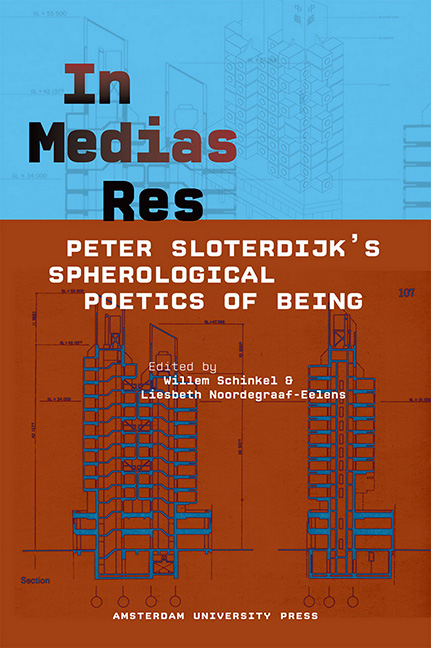Book contents
- Frontmatter
- Contents
- 1 Peter Sloterdijk’s Spherological Acrobatics: An Exercise in Introduction
- 2 Foamy Business: On the Organizational Politics of Atmospheres
- 3 “Transgenous Philosophy”: Post-humanism, Anthropotechnics and the Poetics of Natal Difference
- 4 Disinhibition, Subjectivity and Pride. Or: Guess Who Is Looking?: Peter Sloterdijk’s reconstruction of ‘thymotic’ qualities, psychoanalysis and the question of spectatorship
- 5 Sloterdijk and the Question of an Aesthetic
- 6 Uneasy Places. Monotheism, Christianity, and the Dynamic of the Unlikely in Sloterdijk’s Work – Context and Debate
- 7 The Attention Regime: On Mass Media and the Information Society
- 8 In the Beginning was the Accident: The Crystal Palace as a Cultural Catastrophe and the Emergence of the Cosmic Misfit: A critical approach to Peter Sloterdijk’s Weltinnenraum des Kapitals vs. Fyodor M. Dostoevsky’s Notes from the underground
- 9 A Cautious Prometheus? A Few Steps Toward a Philosophy of Design with Special Attention to Peter Sloterdijk
- 10 Sloterdijk and the Question of Action
- 11 The Space of Global Capitalism and its Imaginary Imperialism: An Interview with Peter Sloterdijk
- Contributors
- Index
3 - “Transgenous Philosophy”: Post-humanism, Anthropotechnics and the Poetics of Natal Difference
Published online by Cambridge University Press: 23 June 2021
- Frontmatter
- Contents
- 1 Peter Sloterdijk’s Spherological Acrobatics: An Exercise in Introduction
- 2 Foamy Business: On the Organizational Politics of Atmospheres
- 3 “Transgenous Philosophy”: Post-humanism, Anthropotechnics and the Poetics of Natal Difference
- 4 Disinhibition, Subjectivity and Pride. Or: Guess Who Is Looking?: Peter Sloterdijk’s reconstruction of ‘thymotic’ qualities, psychoanalysis and the question of spectatorship
- 5 Sloterdijk and the Question of an Aesthetic
- 6 Uneasy Places. Monotheism, Christianity, and the Dynamic of the Unlikely in Sloterdijk’s Work – Context and Debate
- 7 The Attention Regime: On Mass Media and the Information Society
- 8 In the Beginning was the Accident: The Crystal Palace as a Cultural Catastrophe and the Emergence of the Cosmic Misfit: A critical approach to Peter Sloterdijk’s Weltinnenraum des Kapitals vs. Fyodor M. Dostoevsky’s Notes from the underground
- 9 A Cautious Prometheus? A Few Steps Toward a Philosophy of Design with Special Attention to Peter Sloterdijk
- 10 Sloterdijk and the Question of Action
- 11 The Space of Global Capitalism and its Imaginary Imperialism: An Interview with Peter Sloterdijk
- Contributors
- Index
Summary
In this chapter1 I investigate Peter Sloterdijk's relation to humanism, especially in its post-Kantian sense of an ideology of Enlightenment based on anthropology. How does an author who writes after Nietzsche's biopolitical challenge of the Übermensch, Heidegger's ontological upgrading of the humanitas, Foucault's structuralist decentering of man, Derrida's deconstruction of anthropocentric discourse and Deleuze & Guattari's machinic constructivism, relate to the ideology of emancipation through formation (Bildung), i.e. the “anthropotechnics” of reading and writing? What are the biopolitical insights of an “anthropo-phenomenology” or an “anthropology beyond humans”? Can a positive understanding of ‘humanity’ still be found in his work?
Since the Summer of 1999, it has been impossible to find an answer to these questions without reference to the complex context of the affair with which it is customary to associate Sloterdijk's name. The occasion for Jürgen Habermas and other public intellectuals to ring the alarm bell was a philosophico-literary lecture given by Sloterdijk entitled Prescriptions for the Human Park. A Reply to Heidegger's Letter On Humanism. The contents of this text were wilfully and abusively interpreted as a programmatic series of statements on engineering the Übermensch. It soon attracted public attention all over Europe and definitively established Sloterdijk's name as one of the most significant, but also controversial, present-day continental philosophers. The bitter irony of all this attention, in itself an exceptional honour for a demanding philosophical paper, is that the subject of the original text – and this seems to have escaped humanists and transhumanists alike – was first and foremost precisely the question of what it means to write today, after the age of the book and the humanist ideology of its patient reading have come to an end. And despite, or, one is tempted to think, because of, all the attention this text has received since then, this essentially political question is still waiting to be taken seriously.
In the first part of this chapter, I distinguish and briefly discuss two “layers” that together constitute the scandal: Firstly, Sloterdijk's actual text on humanism and formation in the age of genetic engineering, and secondly, the convergence of the scandal and the mass-medial dynamics of “normalization” on the one hand and the hyper-morality and dogmatically conservative humanism of the last generation of Frankfurt School theorists on the other.
- Type
- Chapter
- Information
- In Medias ResPeter Sloterdijk's Spherological Poetics of Being, pp. 43 - 66Publisher: Amsterdam University PressPrint publication year: 2012



